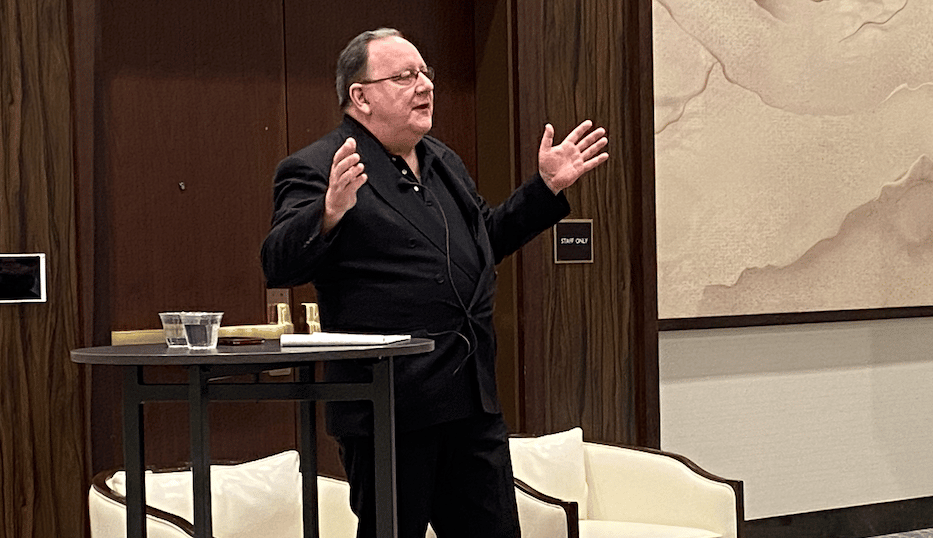An attorney explains some questionable assertions domain investors make.

Last week at the Internet Commerce Association meeting in Las Vegas, attorney John Berryhill discussed some common things he hears domainers say. Here’s what he had to say about these phrases he hears over and over.
“I know it doesn’t have a trademark because I looked.”
So what did you look at? The U.S. Patent and Trademark Office database? International or third-party databases?
John pointed out the definition of a trademark: any word, symbol, sound, color, feeling…anything perceptible by your senses. For domain names, we’re interested in a string of characters.
But a trademark is not an award or certificate given out by a government. Registration of a mark is not required to have a mark. And registration of a mark doesn’t necessarily mean you have an active, defensible trademark.
So what’s the best trademark database? John suggests starting with Google. If you plug in a term and a matching company dominates it, that means a lot, even if you can’t find a registered trademark.
“Parking domains is a bad idea.”
This belief is more true than it used to be because of changes to parking platforms. The key is what ads your parked page is showing. Are they brand-based or related to the dictionary meaning of the domain name?
Let’s say you have the domain monster.whatever. If the parked page shows ads related to Halloween masks, that’s OK (and could actually help you in a cybersquatting dispute). If it comes up with ads related to employment, cables, or energy drinks, that’s an issue.
Parking will kill you if it’s not appropriately targeted. So you need a parking company with configurable parking to ensure it targets a specific topic. Of Frank Schilling’s 35 UDRPs, about 30 of them were won partly because they were parked on topics related to the domain’s definition. So parking can actually help you. (Editor’s note: Uniregistry still lets you target based on categories but not keywords. Hopefully, GoDaddy doesn’t get rid of this.)
What about for sale landers that don’t have ads on them?
John pointed out that UDRP panelists don’t understand the domain name market. What will the panelists infer from the landing page?
Use a parking page service that lets you put custom language about what makes a domain interesting. A landing page for a domain with monster in it could explain possible use for costumes. Consider writing custom descriptions for your most valuable domains. (Editor’s note: Squadhelp and Dan allow you to write custom text. I wonder, however, if Squadhelp’s AI descriptions feature will run into some of the same issues as parking services that adjust keyword targeting for you.)
Oh, and putting “This domain may be available for sale” – John would kill this phrase. If you’re saying it may be for sale, you’re basically saying it’s for sale.
“It’s OK because we hadn’t signed a contract yet” or “I have a contract and he breached it.”
Do you actually have a contract? You can accidentally and easily enter into a contract.
John gave a few examples. One can be summarized this way:
Buyer: What would you sell this domain for?
Domain owner: I would sell it for $10,000.
Buyer: Accepted.
The domain owner tried to back out but the judge ruled it was a contract.
John also gave the example of 420.com. This is a case where a domain sale was negotiated via instant message and the buyer wired the funds, only for the seller to try to back out. This case hasn’t been resolved.






Thanks. Interesting. But I thought it had been established in UDRPs that domain owners can ask whatever they want for a name as long as it doesn’t violate copyrights.
So is it not okay to use a lander without ads that says “(Domain) is for sale” with a BIN no matter how high the price is? E.g. GoDaddy’s ns5.afternic.com and ns6.afternic.com?
John’s point was that if you’re using a for sale lander, go ahead and write why the domain might be valuable. Especially if it’s a common word, because there are bound to be trademarks on that term.
How can parking be used to demonstrate legitimate use for say, words that don’t have commercial meaning but are valuable one word domains or even acronyms of common words, say, ‘utilize’ or ‘foreseeable’ or shortened versions such as foreseeabl
The policy more of less emphasizes the targeting of a trademark as the primary concern, but when I got to (lets say, forseeabl.com) and see ads for: credit cards, nappies, or dog food.. am I simply better of not using parking or just using a good old fashion ‘for sale’ lander or ‘construction soon’ page or nothing else?
This is an actual analogy for a situation I am faced with:
– I have a 5 letter ‘one word’ acronym that was registered approx 5 years before it was trademarked anywhere
– Offered handsomely for it via a brokerage service, except I don’t want to sell it.. I think its value will accrue or I will develop it later myself
– Several other companies have used this in either their trademarks or common law marks (again after I registered it)
– Currently parked at bodis where its bringing up ads for credit cards, gambling or weird conspiracy stuff… none of which are targeting any trademark but not exactly relevant for the domain
I can categorize ads if I was offered this option, emailed uniregistry last year but they advised they don’t offer this service anymore?
Am I relatively safe if:
– Registered first and trademark came several years later
– PPC ads do not -specifically- target the trademark
Hopefully that made sense. Obviously not looking for specific legal advice.
Thank you.
The person won 10,000.
Case settled.
Let me fine that lawyer.
The real crook is Bill Hartzer.
Hiding behind someone else he handled most of the operations of DNProtect.
I never heard a peer out of the other guy.